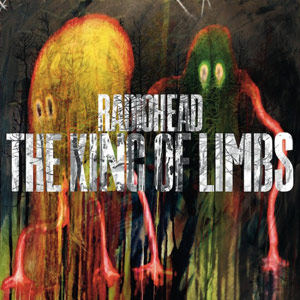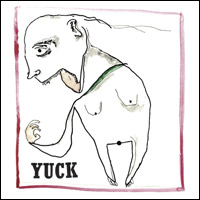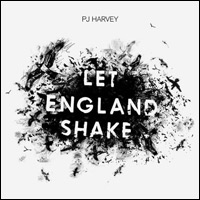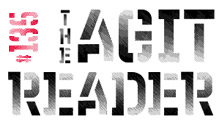
The King of Limbs
TBD
Employing a “pay what you like” selling strategy for the digital release of their last album, In Rainbows, and now unexpectedly hocking a new record on their website more than a month before its physical release, Radiohead has made as much noise for its maneuvers to sidestep the record industry machinery as for the music those releases contain. While admittedly these attempts at democratizing the business side of making music don’t hold true for every band (not everyone has Radiohead’s fanbase), they do show that Radiohead-heads will continue to follow the band down whatever rabbit hole it chooses—and by whatever means afforded them.
In this case, The King of Limbs, the new album, was made available on Friday digitally as either mp3 or FLAC or as part of a pre-order for an elaborate vinyl edition. On first listen, the album shows Radiohead working with the same sonic palette that’s characterized their work as far back as Kid A. Glitched beats, twinkling computerized tones, and other melancholy machinations contrast with Thom Yorke’s howling catharses. One could consider it some analogy for the dilemmas of the new millennium—man versus machine, emotion versus technology, etc.—but one gets the sense that Radiohead’s aesthetic is, at this point, just a simple predilection for gadgetry and all the bleeps and buzzes that can be made with it.
But as for The King of Limbs, within the 38 minutes of its eight songs, there are few surprises, which I think is saying something when it comes to Radiohead. (There’s a bad pun to be made here about the album being possibly made by machines, but then that would be predictable too, so I’m not going to make it.) While it’s not nearly as riveting, “Morning Mr. Magpie” is this year’s “House of Cards,” while “Feral” and “Codex” are reminiscent of the binary language the band has been using since OK Computer. The record is by no means without merit, but one gets the feeling that, for this one, Radiohead was content to skate by on their reputation.
Stephen Slaybaugh

Underneath the Pine
Carpark
As Toro y Moi, Chaz Bundick’s sudden rise was at least in part because of his direct association with the budding “chillwave” phenomenon. (This writer is guilty as charged of making such an association.) And while Causers of This, his debut, was thematically and sonically built upon those cold and hollow aesthetics, it was apparent that Bundick was raised with a worldly scope of reference well beyond 8-bit gaming consoles and Saturday morning cartoons. By the time he’d reached the stage, one could sense that he needed more than a few samplers and a thrift synth to truly express the breadth of what Toro y Moi was really channeling.
On Underneath the Pine, Bundick has taken giant steps to separate himself from his debut: employing a full band, writing intricate arrangements and mish-mashing global rhythms into his bedroom spin on ’70s psychedelia and indulgent ’80s dance music. “New Beat” is entirely representative of this evolution. Where once Bundick’s inhibitions may have suffered for a lack of technology or lack of studio flare, here he airs out every funky bassline, all the intricacies of his squiggly keytar ascensions, each bongo tap, and the vast ethereal tones underlying it all. Directly following Underneath the Pine’s lead single comes “Go with You,” which reveals the other side of Chaz. Had the Zombies been influenced by Tropicalia and George Benson, they might have come up with something similar to “Go With You.” A melancholy cloud hangs over “Before I’m Done,” with the warped layers of mellotron, strings, and horns with which Bundick wraps his songs accentuating what was likely a late-night acoustic guitar composition. Toro y Moi could have just polished a Midnight Star cassette and moaned into an echo chamber for his second act, but fortunately Underneath the Pine shows off his incredible depth as a songwriter and manipulator of sonic atmosphere. Such a shift might even be considered challenging in comparison to Causers of This, as I’m even hearing a little Soft Machine in the bridge of the finale, “Elise.” One can only hope the next “wave,” influenced by Bundick’s piggy-backing virtuosity, looks to Robert Wyatt for inspiration too.
Kevin J. Elliott

Yuck
Fat Possum
Indie rock is back. Those of you wondering what happened to the Up Records roster, or why there haven’t been any more cute, but serious, guitar-driven bands in 15 years or so can rest assured that the preciously angry genre has not faded into the obscurity in which you once wished it was steeped. Yes, we know you abandoned it because you kept hearing it over the speakers at the coffee shop and Urban Outfitters. You dropped it for good because you saw that one jock girl from high school at the Doug Martsch concert wearing faded corduroys and a t-shirt from a band you had never even heard of. You sold your Strat for a Serato set-up and traded your Elliott Smith record collection for a few DFA albums that talked about the same thing I am.
It’s okay, you don’t have to act so mean anymore. Yuck is here, and I swear I’m not being ironic in saying this, it’s okay to listen to indie rock again. If not for the sheer joy of singing along to unabashedly nonsensical lyrics like, “Did you take the rhythm from me? Yesterday I had it all,” (or something) then at least for knowing that you probably sang along to something like that in the ’90s and enjoyed it before Vice shamed you out of it. Now it’s relevant again (indie rock, not Vice), and dude, you were there first! So anyway, this record is great to listen to, and the band’s artwork is pretty gross (they are called Yuck), but interesting to look at in a Ralph Steadman kind of way. The songs are patient and unfold steadily and powerfully, especially at the end of the record. (Like, I dunno, an indie rock record should?!) “Rose Gives a Lilly” and “Rubber” are worth blasting as loud as possible. The weak points only come when the Wilco vocal bits shine through the parts that should sound more like Lou Barlow at his most apathetic. No matter, those parts are few and far between and far overshadowed by interesting guitar sounds and vocal melodies that I can’t get out of my head. Thanks Yuck for giving that boring bearded beast that was indie rock a shave and a haircut and a kick in the ass.
Michael P. O’Shaughnessy
MP3: “Rubber”

End It All
Anticon
It sounds like a game of “what if” played by a couple of dudes who’ve seen High Fidelity too many times. What if the defiantly fractured Antipop Consortium joined forces with the similarly minded hip-hop deconstructionists at the Anticon label? Well, this is one question that can finally be answered, as Antipop’s Beans has released his latest solo record, End It All, on the notable imprint. If this was the early ’00s, college radio music directors would be losing their collective shit right now.
End It All comes on the heels of 2009’s Antiop reunion record, Fluorescent Black, but almost four years removed from Beans’ last solo record, Thorns. For a rock band, that kind of lag barely raises an eyebrow, but in the hip-hop world, it feels like dog years. However, Beans has never really followed the rules, and if you never follow the trend, then you don’t have to ever worry about being out of step.
The only nod to current hip-hop practices was Beans’ decision to bring in help. For example, TV on the Radio’s Tunde Adebimpe duets with Beans on “Mellow You Out.” There’s also outside production, but instead of the usual suspects, he drafted a hilariously eclectic group of knob twiddlers. Nobody, Clark, Interpol’s Sam Fog, Black Moth Super Rainbow’s Tobacco, Four Tet, Tortoise drum section Bumps, Son Lux and others all take a seat behind the boards, so there’s up-tempo electro bounce, deconstructed noise, moody drum workouts, and everything in between. If didn’t know about the outside help, though, this would still feel like the next logical step in Beans’ production.
While there are some changes in the construction, at the end of the day there’s no doubt that End It All is a classic Beans record. Beans’ lyrical style crams so many references, illusions and punchlines into one verse that as soon as you think you have a firm grip, he takes a sharp left and leaves you flying. One verse has more words than some rappers’ entire albums. Yet, it isn’t just a rapid fire verbal bludgeoning. Beans’ vocal style switches cadence on a dime and dances like a snare drum. End It All isn’t just an exercise in technique. He mixes braggadocio with abstract character studies and pointed commentaries on these modern times. And while you have to hope that there isn’t such a long absence again, there’s enough here to chew on for a while.
Dorian S. Ham

Let England Shake
Vagrant
Since the first arid rumble of her debut in 1992, Dry, PJ Harvey has been singular in her sound and approach. On the half-dozen or so records she’s released since then, she has attacked romance and sexual politics with nerves of steel and a voice of amber. Her songs have contained equal amounts animosity and compassion, while musically she’s run the gamut from post-punk crunch to piano balladry. In short, there’s been few artists whose vision has aimed so true.
For her latest release, Harvey recorded with longtime collaborator John Parish and frequent contributors Mick Harvey and producer Flood in a 19th century church on a cliff in Dorset overlooking the English Channel. Harvey grew up in Dorset, so perhaps it was the setting that inspired the record’s lyrical content, which, as the title indicates, is largely concerned with her homeland. But though there are political undertones and, less frequently, hereditary pride, Harvey addresses her relationship with her country with the same mixed feelings with which she’s described any other relationship. On “The Last Living Rose” she vocalizes a longing for home with less than flattery terms: “Take me back to beautiful England and... Let me walk through the stinking alleys to the music of drunken beatings, past the Thames River glistening like gold hastily sold for nothing!” Songs with titles like “The Glorious Land” are filled with similarly contrasting imagery, while on “The Words That Maketh Murder,” she gets vaguely political, describing “soldiers (that) fell like lumps of meat.” Similar imagery is utilized in “In the Dark Places,” as Harvey describes “young men hid with guns,” but she takes care to retain a first person perspective. From an American point of view, it’s hard to understand an idea like national identity. Harvey may be just as confused, but she finds her own way in identifying with her country, and in doing so, once again reveals something personal and provocative.
Stephen Slaybaugh
ALBUM REVIEWS
DeVotchKa, 100 Lovers
Chain & the Gang, Music's Not for Everyone
Win Win, Win Win
East River Pipe, We Live in Rented Rooms
Mogwai, Hardcore Will Never Die, But You Will
Cowboy Junkies, Demons
La Sera, La Sera and The Babies, The Babies
The Twilight Singers, Dynamite Steps
Dom, Sun Bronzed Greek Gods EP
The Go! Team, Rolling Blackouts
John Vanderslice, White Wilderness
Monotonix, Not Yet
Sonny Smith, 100 Records Volume II: I Miss the Jams
Lia Ices, Grown Unknown
